
The Loneliest Whale: The Search for 52 is a documentary written and directed by Joshua Zeman, where the award-winning filmmaker becomes a contemporary Captain Ahab, seeking his own whale. His Moby Dick is the “52 Hertz Whale,” which scientists believe has spent his entire life in solitude, calling out at a frequency that is different from any other whale.
This is the only film that set out in search of 52 and has had the support of Leonardo DiCaprio’s production company Appian Way, being a story that enlightens on the similarities between the creatures of our planet and human beings.

This specific marine mammal was originally discovered in 1989 and until this very day it has become a global sensation, enthralling people who feel sympathy and curiosity for the way the aquatic animal has wandered in solitude throughout his life. The story about the lonely whale has so far been featured in The New York Times, The Washington Post, Business Insider and many more. Even musicians have homaged the whale, through their songs, like the British Indie Rock band Amber Run, the K-pop band BTS and Kate Micucci — who is featured in the documentary— with her song Doreen the Whale.
The documentary does not portray whales as anthropomorphic, but it does underline what makes them similar to humans. They have complex behaviours, parental care and possess neurones and cells that make them sentient beings. The ability to perceive and feel makes 52’s solitude exceptionally relatable to audiences. The whale’s sad story creates empathy because people can relate to that feeling of being an outsider. Just like human beings, whales are very social beings and 52 symbolises the urge to connect. Hence his loneliness speaks to many and that is why he became a global phenomenon.
The uncertainty of not being able to find the aquatic mammal was another empathetic trait of the film, as Zeman expressed: “We all fear the risk of believing in something that may not come true.” For instance, the film crew embarked upon on a mission of discovery, without being certain of accomplishing the set goal. But it’s part of the thrill of the journey. As one of the team members says: “to be a true explorer you have to be willing to put yourself at risk, or you are not going to succeed with it.” This is what the entire crew does, hoping to find 52, and ultimately confronting an unexpected outcome to this search.
Joshua Zeman, who has been at the forefront of investigative documentaries — as attested by his Netflix docu-series, The Sons Of Sam: A Descent Into Darkness and the critically-acclaimed film Cropsey — maintains his thrilling grasp in the storytelling of his latest work. The Loneliest Whale: The Search for 52 boards on an engrossing quest to find the eponymous creature, whilst retracing the history of man’s rapport with these gentle giants.

Men have always been in awe of what happens under water, and writers have continuously narrating about the great mysteries of whale stories: from being swallowed by giant fish like in the Book of Jonah or in Carlo Collodi’s The Adventures of Pinocchio to hunting ferociously marine mammals like in Herman Melville’s Moby Dick. Mankind has hunted down whales increasingly since the 19th century, when the industrial revolution created a great demand for whale oil. The methods became hauntingly brutal, with a floating factory of vessels that would use explosives and harpoon darts. As the documentary explains, this became a sort of disassembly line, one corpse after the next. But by the Sixties ecological movements started to shed a new light on whales. American biologist Robert Payne discovered the whale song and released an LP called Songs of the Humpback Whale (which is still the best-selling nature sound record of all time), that helped fight against commercial whaling to the extent that it was finally banned in 1986.
The analysis of the siren song of the ocean is also connected to the discoveries of a pioneer in marine mammal bioacoustics, Dr. William Watkins, who had come to the conclusion that “What we can hear can be more powerful than what we can see.” In fact, listening to whale vocalisation made people care and truly want to change the world. Unfortunately as the film shows, the mystery of under water sound — that helps cetaceans communicate with one another — is being smothered by the amount of ships sailing across the waterways. The noise levels have become so loud, that by suffocating these creatures with noise, we are creating an ocean of lonely creatures.
The Loneliest Whale: The Search for 52, confronts environmental issues but also serves as a mirror of our society. It is an idyllic parable about communication, and how connection between beings makes us realise that life is all about interconnection. Audiences will explore what this whale’s lonely plight can teach us, not just about our changing relationship to the oceans, but to each other; they will ultimately discover that the marine realm is not a lonely place after all, and contains an ocean of humanity.
Final Grade: B+
All Images Courtsey of Bleecker Street

